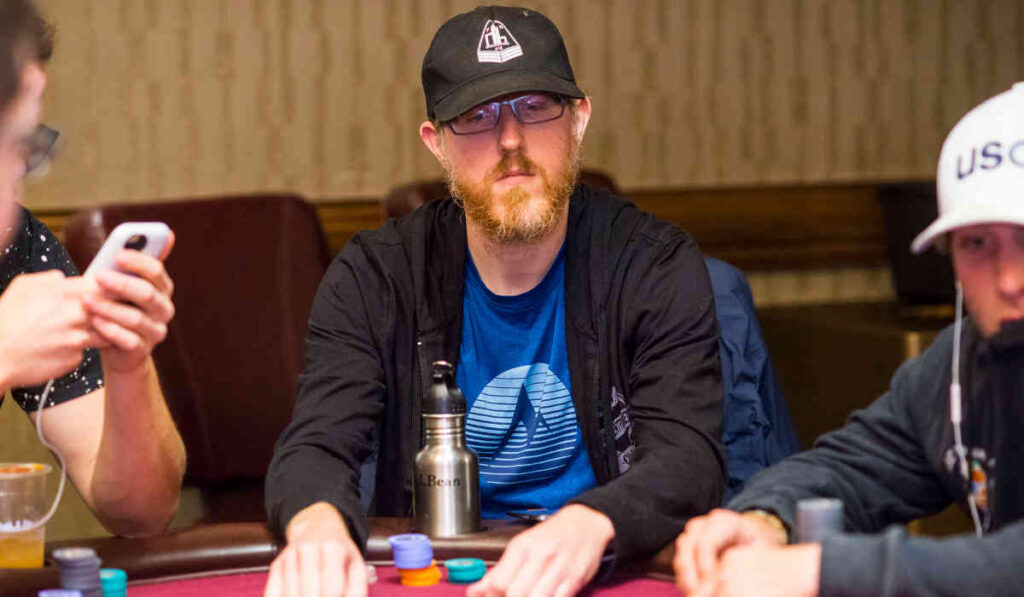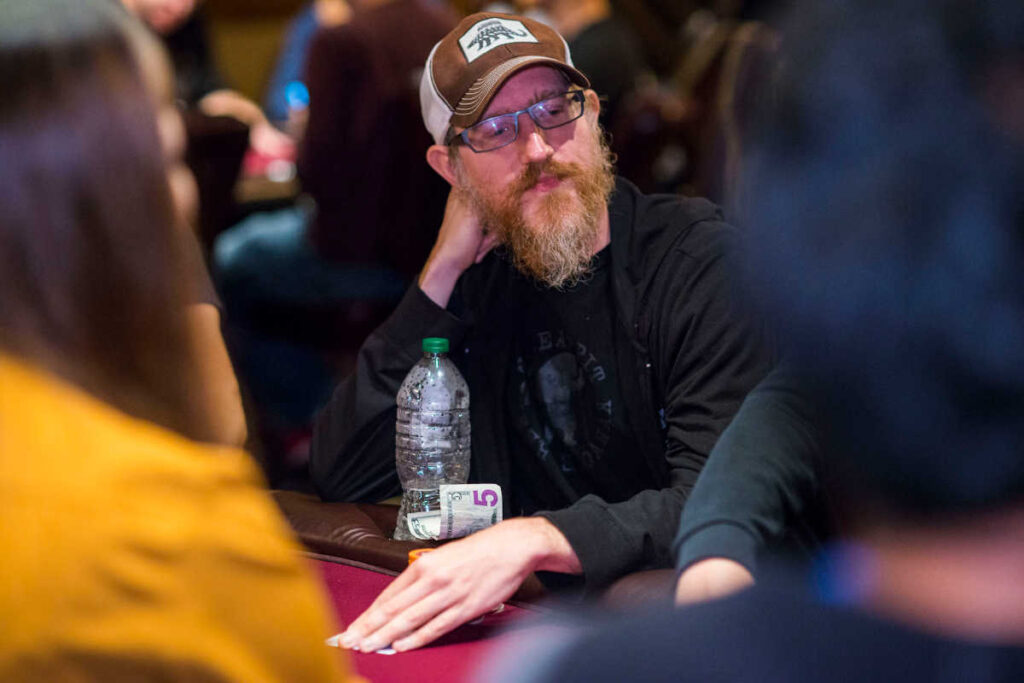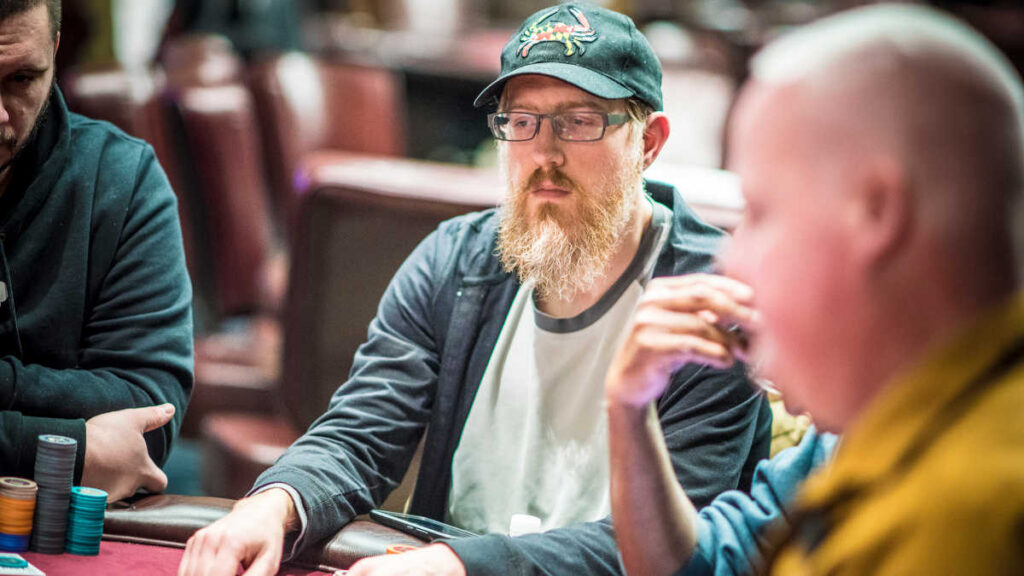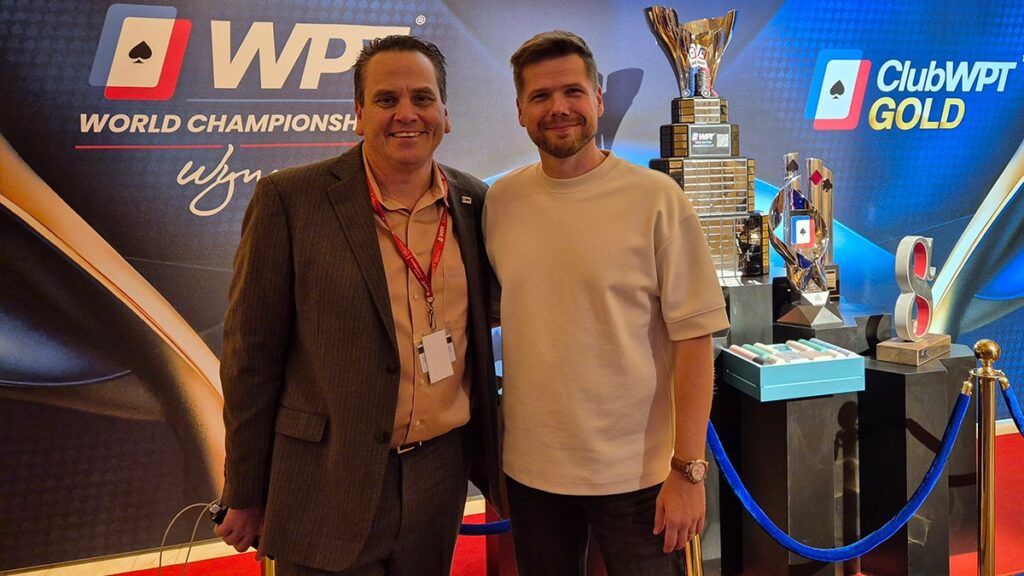Images courtesy of World Poker Tour
Modern poker players owe a great debt to the poker pioneers of the past who have contributed to poker as we know it today.
The popularity of online poker? Pat on the back for Chris Moneymaker. The rise and rise of sponsored professionals? Kudos to Daniel Negreanu and Gus Hansen among others.
In today’s poker world of GTO strategy, hybrid formats and mystery bounties, making sense of the ever-changing landscape is often something that only players who have seen the game from a distance can truly summarise.
In that sense, the podcasters of the poker world have taken over. One such podcast host with a great deal of knowledge about he past and present of poker is Andrew Brokos.
Andrew has seen his Thinking Poker Podcast – along with co-host Carlos Welch – prove immensely popular since it first came on the airwaves in 2012. Today, the podcast still thrills thousands of players and fans every week who tune in for the guest interviews, stay for the strategy but are all truly hooked by the sheer entertainment in each and every episode.
We caught up with Andrew to speak about how poker is changing and his role within the landscape as he sees it.
The Changing Face of Poker
Andrew has been playing poker for over 20 years and in that time has seen several eras in the game we all love. He thinks one particular recent innovation has changed the game more than any other.
I came in after the advent of online poker, though I only missed it by a few years. I’ll say this about game theory solvers: the ability to get objective (even if they are not definitive) answers to strategy questions that used to be considered questions of style or the sort of thing good players could differ on has fundamentally changed the way we study, think, and talk about poker.
As Andrew reflects, players who barely know what solvers even are remain the beneficiaries of their insights, meaning GTO plays have ‘trickled into common knowledge among more casual players’ – quite the innovation, whether players know it or not.
In that time, the growth of poker podcasts has been exponential. There are so many around now, but Thinking Poker Podcast is one of the old guard at 13 years of shows.
I don’t think [podcasts are] essential, though I certainly appreciate that people listen to ours!” says Andrew. I guess something that doesn’t need to be read or watched is nice for listening at the table or while driving to or from the casino.
A Lifetime of Loving the Main Event

Andrew has a superb record in the WSOP Main Event, finishing in the money six times between 2006 and 2019. While he concedes that ‘run good is an essential component’, Andrew also says that his embracing of unique situations has helped him in the World Championship over the years.
The Main Event is unique in terms of being a high stakes event with a slow structure where you may well encounter the best and worst players you will encounter all year, possibly even at the same table.
It presents situations that are not reducible to solver solutions. Even pros succumb to the pressure on later days – there’s never a ‘standard’ play as far as I’m concerned.
A poker solver might tell you check-shove the turn with your flush draw, but do you really want to put your stack on the line pushing a thin edge against the best player at the table when there’s a guy in a chicken suit playing 70% of hands?
As Andrew details, every hand of the Main Event has to be evaluated in light of the opportunities you can anticipate in the future.
There are so many factors that don’t come up in any other event. Every Main Event moment is unique, and one from Andrew’s first-ever World Championship in 2006 comes to his mind.
I had won a satellite and could hardly believe I was really playing at the WSOP. It was my first time in Las Vegas and one of my first times playing live poker at all.
The $10,000 buy-in represented about a quarter of my net worth, and I had 100% of myself, because I didn’t know any better. My starting table included a player named William Rockwell who’d largely lost the use of his arms in a motorcycle accident.
As Andrew tells us, that created an extraordinary opponent to face across the felt in his first World Championship.
He played with his feet! Using his toes, he could cut a specific number of chips off his stack and push them into the pot. With the help of a ramp, he could peak at his hole cards. The only thing he needed help with was stacking his chips after he won a pot – he had an assistant for that.
Andrew’s opponent got off to a rough start, losing a few medium-sized pots to Andrew off the bat.
I could feel the frustration radiating off him, says Andrew. We got into a pot where I raised one of his limps with K-Q and we both checked a pair flop. On the turn, he checked again, I bet, and he raised me.
All I had was K-Q high, but I was confident he either had trips or nothing, and it was a hell of a lot easier to have nothing. I called, and when he bombed the river, I called again, for about a quarter of my stack. The whole table exploded when I won such a big pot with king-high.
From Andrew’s perspective, he didn’t feel it was a difficult call to make, at least from a purely strategic point of view. His opponent was obviously bluffing in his opinion. But in making the call, he showed himself that he had what it took to invest in his reads even when the stakes were stratospheric.
Not just in terms of dollars, but in terms of ego and pride. I can’t imagine how sick to my stomach I would have been if he’d showed trips and I lost! I would have felt like such an idiot to lose such a big pot in the first few levels of what I thought would be the first, last, and only Main Event of my life.
I’ve played a lot of poker since then, but I’ve never again had cause to hero call the river with king-high against a player bluffing with his toes.
Fame and Fortune
Andrew ended up making Day 4 of that Main Event, playing No Limit Hold’em on the ESPN feature table. He was incredibly excited, and told all his friends and family to tune in. In his own words,
When my episode finally aired, I wasn’t on it at all! You could see my face once, through Annie Duke’s armpit. Not even my grandmother recognized me!
With just under a $1M in live poker earnings alone, Andrew’s ability to talk about the game and put it into action at the felt is one that he’s proud of.
All my projects feed one another, Andrew tells us. My experiences over the felt provide fodder for books, videos, and articles, and the need to produce books, videos, and articles creates the impetus for me to study and improve.
Interviewing so many different kinds of players for my podcast gives me insight into different ways people think about the game, which helps me get inside the heads of my opponents.
Over the years, many poker dealers and other industry insiders have told that same story. Good players learn not just about playing their cards but also about others’ general demeanor and their approach to the game.
Andrew’s sole ranking title was an impressive one, the 1st Annual Gold Rush event in Las Vegas, where he beat Stuart Turvey heads-up to take the title and $125,560 in November of 2015. Almost a decade on from that victory, he tells us that winning for its own sake was never his ambition.
That’s why I don’t play that many tournaments, and why I often play large fields when I do. When the opportunities are less optimal, I’d rather be playing cash or recording a podcast or, you know, living my life.
I’ve interviewed people who seem deeply invested in winning trophies and being recognized as one of the best and that has just never resonated with me. I know it fuels some people, but in general I think that kind of ego investment is detrimental in a game with so much potential to bruise your ego.
Andrew admits that while all that remains true, winning is fun and live victories mean more than online success, where of course he has won many events. The Gold Rush event, held at Lucky Chances, had satellites for weeks in advance, so much so that everyone in the area was talking about it for a long time before… and after.
Weeks after I won, I had people I’d never met before introducing themselves, congratulating me, and asking me about it. I also had people I didn’t know asking for staking or to borrow money, which was uncomfortable to navigate.
The Art of Poker

All his life, Andrew has read fiction, and while in some ways, poker flies in the face of the imagination, the pure math behind it being so clinical, in other ways, the game is pre-destined to bleed emotion, to be dramatic and consequential. It’s why we all love it. Fiction and poker combined for Andrew when he wrote a poker story for 2+2 Magazine back in the day.
You know how we talk about ‘The Poker Gods’ wanting us to win or lose a specific hand or tournament? This story was from the perspective of one of the Poker Gods – a poker paradeity actually – aspiring to become a full-fledged poker god. I rehosted the story on my own site in case anyone is curious.
For Andrew, writing and painting always felt like intellectual pursuits as well as artistic ones.
It felt like it was exercising a lot of the same muscles as playing or writing about poker, which wasn’t ultimately all that satisfying as an aesthetic experience, he says.
Lately, I’ve gotten really into drawing, which I never suspected I had any aptitude for, such as a picture I drew of Caitlyn Arnwine (below), another of my all-time favorite podcast guests.
The Best Guest He (Almost) Never Had
One podcast guest that Andrew missed out was a player who defines the game in which he played for so many years – Doyle Brunson.
This is selfish, but when Doyle Brunson passed, my first thought was, ‘Guess we’ll never interview him now’… although I actually did sort of interview him.
Andrew sat next to ‘Texas Dolly’ him the entirety of his Day 1 of the WSOP Main Event one year and took every opportunity to ask him questions during gameplay. What Doyle didn’t know was that his answers were going around the world.
Unbeknownst to him, I was live tweeting the entire exchange. I believe it was the final time he played the Main Event. He was in his 80s and obviously exhausted at the end of the day, but he also had more chips than anyone else, and he ultimately made the money.
Over the 13 years that Thinking Poker Podcast has been running, Andrew has a quick response when we ask him who his favorite ever guest has been – it’s his co-host Carlos Welch.
I met him at the WSOP in 2012, about a year after Nate Meyvis and I had started the podcast. He was a fan of my videos on Tournament Poker Edge and railed me for a bit during the series.
We chatted on break, and as he told me about himself and how he was grinding single-table satellites and sleeping in his van, all I could think was, ‘My God, we have got to interview this guy’.
Andrew and Nate did exactly that and Carlos became not only a regular guest on the show but one of Andrew’s best friends. When Nate stepped away from the show, Carlos wasn’t just the natural choice to replace him – he was the only choice.
I couldn’t imagine doing the show with anyone else. I sometimes think we started the show in order to meet Carlos, even though we didn’t know he existed at the time.
After 13 years of the Thinking Poker Podcast, there is more the feeling of what is to come rather than what has been in the past.
For Andrew Brokos, this projected poker future is one he is marching towards with his seemingly boundless enthusiasm and curiosity. After 20 years in the game, you get the feeling that he’s just getting started.


